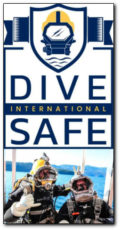Toolbox Talk: The Importance of Having a Daily One
By CADC Admin ~ February 14th, 2022. Filed under: Safety.
Toolbox Talk: The Importance of Having a Daily One
By Sarah Jenkins, Health & Safety Coordinator, Canadyne Navigation
An occupational health and safety plan is quite a large document. It usually includes everything from a health and safety policy to emergency procedures and safe work practices. Having a health and safety plan in place is only half of the battle, though. Your job isn’t finished just by having the documents. The information within the documents must be properly communicated to every diver on-site.
Just like many other situations in life, proper communication about a company’s health and safety plan helps prevent many a misunderstanding. One of the most under-rated parts of a health and safety plan is communication. You can have all the policies, procedures, and protocols in the world—but if you don’t communicate them properly to your dive team, you have nothing.
The most beneficial way of communicating the safety plan is through toolbox talks. Toolbox talks are informal, recorded discussions typically held at the beginning of a workday. The beauty of toolbox talks is they lead to an opportunity for discussion. They give employees the ability to recognize and control the hazards in their workplace.
Occupational health and safety is so much more than dictating rules and regulations to your team. The informality of a toolbox talk allows dive crew members to feel comfortable asking questions, requesting clarification, and adding their own input. It’s also worth noting the importance of leaving time at the end of the toolbox talk for team members to bring up their own safety concerns, should they have any. Toolbox talk topics can vary from general safe work practices and / or company policies, to occupational health and safety regulations explained in more depth or jobsite specific hazards.
Participation is what makes the safety plan effective. If team members feel they can actively participate in the safety plan, you’re creating a safety culture that’s inclusive. Allowing team members to participate in daily toolbox talks will give them the autonomy to bring up safety concerns without fear of punishment. It enforces the, “If you see something, say something” mentality of safety, which is so important.
Commercial diving is high-risk. There are many hazards associated with it. Toolbox talks allow each member of the dive team to have the dive plan properly communicated to them. There are a few tips and tricks to keep in mind that can help make your daily toolbox talks more effective for every member of your team, including:
- By preparing toolbox talks in advance, you can ensure you’re familiar and comfortable with the content, which will help you be able to communicate it clearly to your audience. Read through the material you’ve researched and prepared ahead of time. You’ll be able to portray the information much more clearly if you aren’t presenting it for the very first time.
- By sticking to material that’s relevant to your jobsite and workplace, you’ll keep your audience engaged and relating to the content.
- By getting into the habit of doing toolbox talks daily, you’re reminding your dive crew that health and safety is a priority on the jobsite.
- By keeping your toolbox talks short and one-topic focused, you’re less likely to lose the attention-span of your team.
- By having divers demonstrate safe work practices, you can see they understand the topic you’re discussing.
It’s important for the dive crew to see that management is committed to health and safety. Something as small as taking five minutes to present a toolbox talk every morning reminds workers that management is committed to their safety and well-being on site. If you’re willing to skip the toolbox talk because you “don’t have time,” you’re sending a message to your workers that productivity is valued more than your safety culture.
Occupational health and safety on site takes a village. It starts with the management’s commitment to establishing a positive safety culture on-site. It continues with the three rights of workers: the right to refuse, the right to know, and the right to participate. The right to participate in decisions that could affect their health and safety will help keep your dive crew engaged in their safety program. When an employee has the proper tools and techniques to work safely, they’re more likely to sustain these behaviours and pass them on to new hires.
Toolbox talks are one tool (of many) within occupational health and safety practices that can help protect and educate your dive crew.
Sarah Jenkins is health and safety coordinator at Canadyne Navigation, a CADC marine construction and diving company based out of Carleton Place, Ontario






